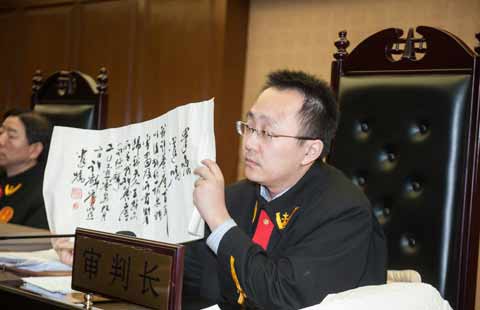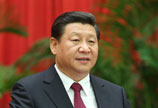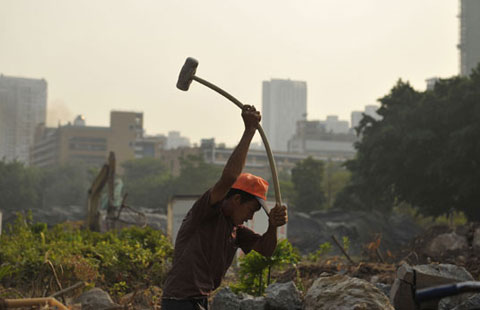Foshan: Foreign talent, advanced products
By Xu Jingxi (China Daily) Updated: 2014-11-06 07:36Transformation for famed Pearl River Delta manufacturing hub
During an overseas business trip two weeks ago, the strong investment promotion team from the Foshan Bureau of Commerce surprised their hosts in the United States, including a senior executive at IT giant Oracle and a Stanford law lecturer.
The US hosts were impressed when Nicolas Santo, a 27-year-old Uruguayan, presented his business card with the title of the manager of the bureau's international investment promotion team.
Although it is common to meet expats working for foreign businesses or as English teachers in China, it is still highly unusual to see a foreign face in the government.
In addition to Santo, another three foreigners work in the investment promotion team from Foshan, Guangdong province - two from the United Kingdom and one from Mexico.
"People we met in the US were very interested in knowing more about our practice of employing foreigners. Our international team has become a signature of Foshan," Zhou Zhitong, chief of the Foshan Bureau of Commerce, told China Daily.
Mei Gechlik, a law lecturer and founder of the China Guiding Cases Project at Stanford University, had planned to have a 30-minute talk with Zhou but changed her mind after seeing Santo, asking the bureau chief about his international team for about an hour.
"Foshan is building an open, international business environment," Zhou said. "The employment of foreign talent shows the Foshan government's determination and their happy stay in Foshan proves to foreign investors that Foshan is a good place for foreigners to work and live."
International vision
"We didn't hire the foreign staff as a publicity stunt," said the bureau chief. "They have brought much-needed help to our investment promotion and further opened up our minds to new ideas for developing Foshan's economy."
Santo has been working with great zeal to prove his value in helping the city become a popular destination for investment and help in the transformation from a traditional manufacturing city into an advanced equipment manufacturing base in the Pearl River Delta.
The young Uruguayan is a Montevideo University law graduate and earned a master's degree from Tsinghua University, where he studied China's "going global" strategy. He also spent a year as a visiting scholar at Harvard University researching Sino-Latin American economic relations.
As a foreigner, Santo is familiar with the names and titles of Chinese and local government leaders and keeps track of the latest policies.
He is also very familiar with the latest economic and industrial dynamics in Foshan and Guangdong.
He mentioned quite a few companies that have grown into strong local players.
"For example, Keda Clean Energy Co in Foshan was named one of the next top 100 Chinese global giants by the Association of Chartered Certified Accountants," Santo said.
He is good at analyzing information from foreign media and professional institutions to detect opportunities for Foshan's industries.
"Recently, the governments of Guangdong province and Foshan have positioned the city as a global equipment manufacturing hub," Santo said.
Manufacturing base
The Guangdong provincial government made a strategic decision in August to build an industrial belt for advanced equipment manufacturing in the region west of the Pearl River and set a goal of achieving output worth 2 trillion yuan ($327 billion) by 2020.
Miao Wei, minister of Industry and Information Technology, showed support for the industrial belt, proposing to include it in China's 13th Five-Year Plan (2016-20) during a meeting in Zhuhai, Guangdong province.
The plan will cover the five cities of Foshan, Zhongshan, Jiangmen, Yangjiang and Zhuhai. And there is "no doubt" that Foshan - already the industrial hub in the region - will play the "core and leading" role, according to Zhou of the Foshan Bureau of Commerce.
"We have a solid foundation in the manufacturing sector. We also have an international business environment and a welcoming attitude to international talent, which is shown by cooperative projects such as Foshan Sino-German Industrial Services Zone and, of course, my bureau's employment of foreigners," he said.
Equipment manufacturing is already a core industry for Foshan, which produced 418.3 billion yuan ($68.4 billion) worth of products in 2013. The output is expected to reach 1 trillion yuan by 2020.
The city has 932 foreign-invested businesses engaged in equipment manufacturing. Their combined investment has reached about $11.54 billion.
Lu Yi, acting mayor of Foshan, told China Daily that the city will set up a development fund for the equipment manufacturing industry, which means at least 10 million yuan will be invested every year to support technological development starting in 2015.
Intelligent manufacturing, energy conservation and environmental protection equipment, new energy equipment, vehicle manufacturing, marine engineering equipment and industrial services will be prioritized, according to Lu.
xujingxi@chinadaily.com.cn

|
Foshan Bureau of Commerce Chief Zhou Zhitong (second from right) and his foreign colleagues with Harley Seyedin (center), president of AmCham South China. Photos Provided to China Daily |
- New Xinjiang railway security tight
- Capital regulations to ensure smooth running of major events
- Xi listed as world's third most powerful person
- Faster pace to protect Internet
- Collusion between business, govt cited as concern
- Stronger willpower for Beijing's seniors
- No timetable for full relaxation on one-child policy
- China willing to share anti-terror intelligence
- Chinese government appoints, removes officials
- More than 40% of China's arable land degraded: report








